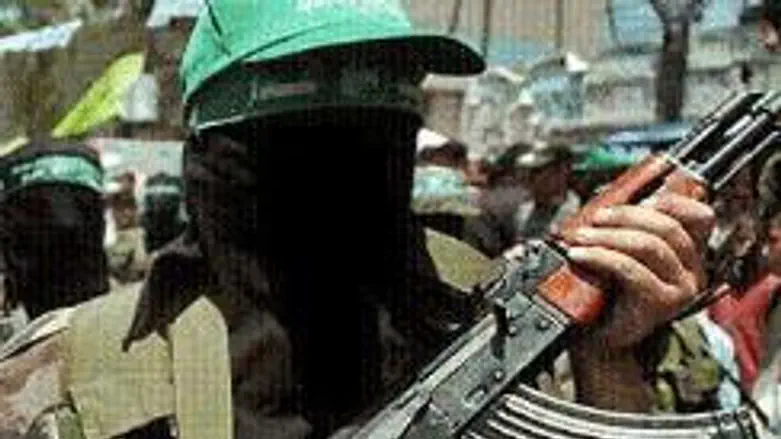
The Olmert government and Hamas traded verbal fire Sunday. The Hamas terrorist organization claims that the official end of the ceasefire is nearing. The ceasefire was to last for "approximately" six months and no specific expiry date was set, but Hamas has chosen to make December 19 the final day.
The truce had been broken dozens of times by Hamas until early November, when an IDF counterterrorist operation against a planned terrorist kidnapping attack was countered with several barrages of Arab rocket fire as far north as Ashkelon.
Outgoing Prime Minister Ehud Olmert repeated warnings that he has made for nearly three years that "there will be no unilateral fire from Gaza on Israel." His comment came a day after Foreign Minister Tzipi Livni, his successor as the Kadima party leader, called the ceasefire a "shame" and that Israel should be answering "fire with fire."
Hamas warned that the truce will not be extended because Israel "has no genuine commitment" to the terms of agreement.
However, underneath the rhetoric by Hamas, efforts are being made through Egyptian negotiators to extend the truce. Cairo has backed Israel's efforts to continue the official ceasefire, despite its having been broken numerous times.
Amos Gilad, head of the Defense Ministry security-political department, visited Egyptian officials on Sunday, ostensibly to discuss the issue while Gaza terrorists continue to fire occasional rockets and mortar shells on the western Negev.
However, he said Monday morning, "There was no need to discuss extending the ceasefire" and that the Gaza ceasefire still is in effect because there is no expiry date stated in the June 19 agreement. He told Voice of Israel government radio that his discussions involved other unspecified issues.
Outgoing Prime Minister Ehud Olmert agreed to the truce, which was supposed to last for several months and then be extended to Judea and Samaria if it were successful. Gilad maintained that the ceasefire is effective despite constant attacks because there has been a "dramatic decline" in the number of rockets and mortars fired on Israel since the agreement began. The government's continued rhetoric of threatening to retaliate has come under increasing criticism from the Opposition and media, as well as from within Kadima. Vice Prime Minister Chaim Ramon (Kadima) told the Cabinet Sunday that Gilad should have remained in Israel instead of talking with Egyptian officials. "It's not proper to send Amos Gilad to conduct negotiations in Egypt over continuing the lull before the cabinet has made a decision on whether it even wants to continue the lull," he said. He made his remarks before Gilad maintained that extending the ceasefire is a non-issue.
Israel Gives Hamas Money while Shalit Remains in Captivity
Matti Golan, former editor of Globes and Haaretz, chastised the Olmert government for allowing the transfer of cash to Hamas which continues to hold kidnapped IDF soldier Gilad Shalit.
The fate of the soldier recently has been at the center of election campaign rhetoric. Golan wrote in Globes that if Hamas needs the money badly enough, it could be told that it first must free Shalit.
As Israeli politicians argue over whether anything can be done to rescue him from his nearly 30-month old captivity, Hamas exploited the division by mocking Israel's failure to bring about his release. The terrorist organization displayed an effigy of Shalit at a Hamas rally while Hamas supporters cried out, "I miss my mommy and daddy.'